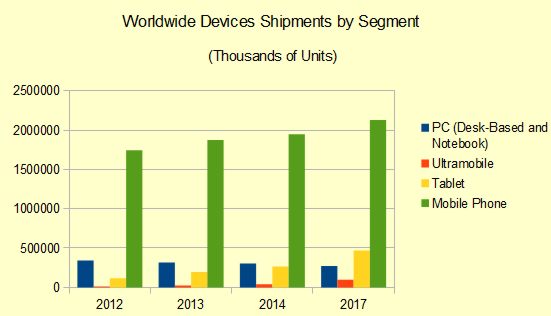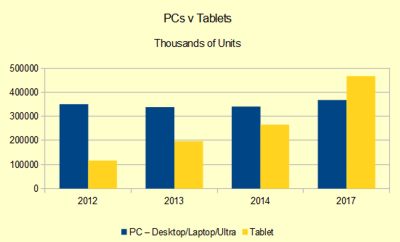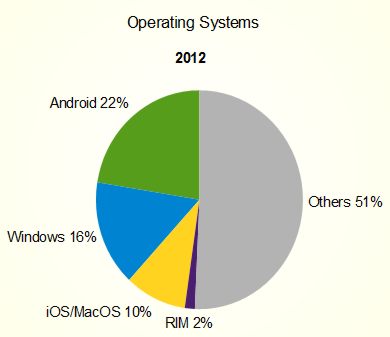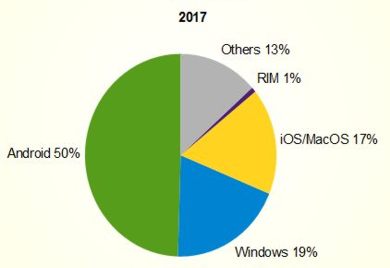| The Future Is Android |
| Written by Janet Swift | ||||||||||||||||||||||||||||||||||||||||||||||||||||||||||||||||||||||||||||||||
| Wednesday, 10 April 2013 | ||||||||||||||||||||||||||||||||||||||||||||||||||||||||||||||||||||||||||||||||
|
Projections from Gartner suggest that as consumers move away from desktop PCs Android will become the overwhelmingly dominant operating system, with iOS/MacOS and Windows competing for second place. Figures from Gartner's recent report, "Forecast: Devices by Operating System and User Type, Worldwide, 2010-2017, 1Q13 Update." indicate that "Worldwide devices", the combined shipments of PCs, tablets and mobile phones are set to total 2.4 billion units in 2013, a 9% increase from 2012. Looking further ahead, Gartner forecasts that device shipments will continue to grow, reaching more than 2.9 billion units in 2017, but the mix of these devices will significantly change over the forecast period with an accelerating shift from PCs to tablets due to the proliferation of lower-priced tablets and their growing capability.
Commenting on these projections, Carolina Milanesi, research vice president at Gartner, said: "While there will be some individuals who retain both a personal PC and a tablet, especially those who use either or both for work and play, most will be satisfied with the experience they get from a tablet as their main computing device. As consumers shift their time away from their PC to tablets and smartphones, they will no longer see their PC as a device that they need to replace on a regular basis."
In the above chart Mobile Phones obviously dominate but if we focus on tablets versus PCs with Ultra Mobiles, e.g. Netbooks, and presumably Microsoft's Surface devices, added to desktop and laptop models, the rate at which tablets are expected to replace PCs is more obvious:
In 2013, tablet shipments are forecast to experience a 70% percent increase over 2012 and by 2017 over four times as many tablets are expected to ship as in 2012. Ranjit Atwal, research director at Gartner. commented: "Lower prices, form factor variety, cloud update and consumers' addiction to apps will be the key drivers in the tablet market. Growth in the tablet segment will not be limited to mature markets alone. Users in emerging markets who are looking for a companion to their mobile phone will increasingly choose a tablet as their first computing device and not a PC." It is the impact this will have on the distribution of operating systems that is of most interest to developers:
On devices that shipped in 2012 Android took a 22% share compared to Windows 16%. iOS/MAC had 10% and RIM 2% and the grey area on the chart "Others" was the major share. So what does "Others" refer to? It can't just be Linux which is so insignificant as to not to be split out.
The "Others" category is the only one, apart from RIM, that is expected to fall - by "2% in 2013 and by 65% by 2017. This mainly reflects the shift from simpler mobile phones to Smart phones and the rest is other smartphone operating systems - remember these are worldwide shipments. As "Others" erodes Windows does experience an increase in its share of the OS market and in 2017 65% more devices in total will be using it than in 2012. iOS/MAC gains even more devices - it user base more than doubles by 2017, But it is Android that sees the most dramatic increase - almost tripling by 2017. This is the way the distribution is expected to look in 2017 with Android having 50% share with Windows and iOS/MAC on less than 20% each.
So the future is mostly Android. Of course we have seen things change more rapidly than prediction allows for before and this prediction is based on things going on as they are today. What could the potenial discontinuous change be? There are a number of possibilities. Chromebooks might sweep the market making inroads into both iOS and Windows use. Mozilla might have a winner on its hands with Firefox OS, taking market share from Android. It could even be that Microsoft manages to work out how to get Windows to work properly on tablets and phones and it could add to the Windows user base by taking share from Android and iOS - but this last one doesn't look likely at the moment.
More InformationRelated ArticlesAndroid Reaches New Record Level Tablet Market Slows Giving Android an Advantage RIM - BlackBerry 10 Could Be Bigger Than Windows Phone 8 To be informed about new articles on I Programmer, install the I Programmer Toolbar, subscribe to the RSS feed, follow us on, Twitter, Facebook, Google+ or Linkedin, or sign up for our weekly newsletter.
Comments
or email your comment to: comments@i-programmer.info
|
||||||||||||||||||||||||||||||||||||||||||||||||||||||||||||||||||||||||||||||||
| Last Updated ( Wednesday, 10 April 2013 ) | ||||||||||||||||||||||||||||||||||||||||||||||||||||||||||||||||||||||||||||||||






